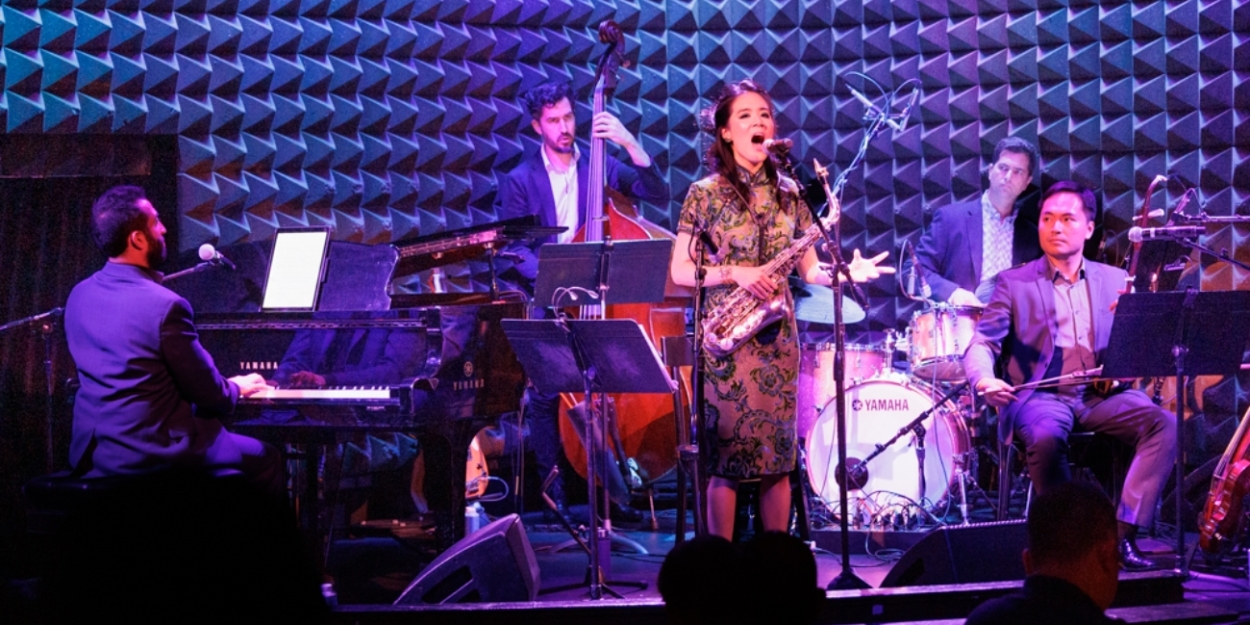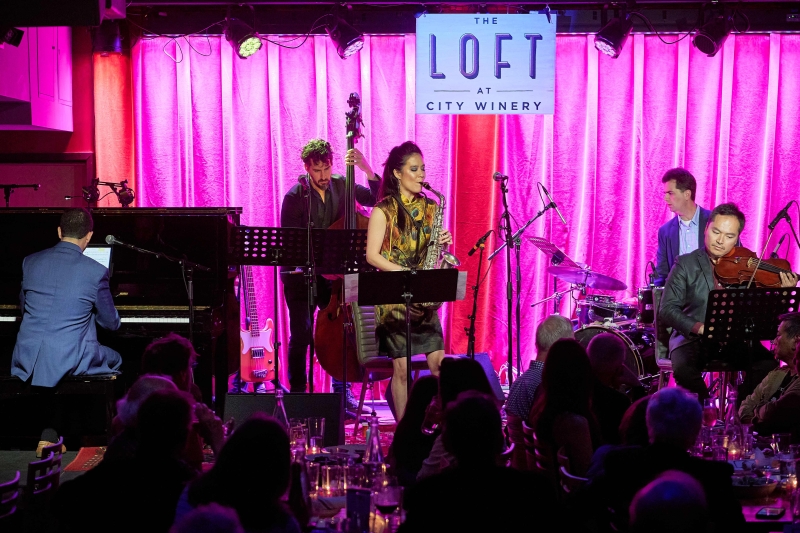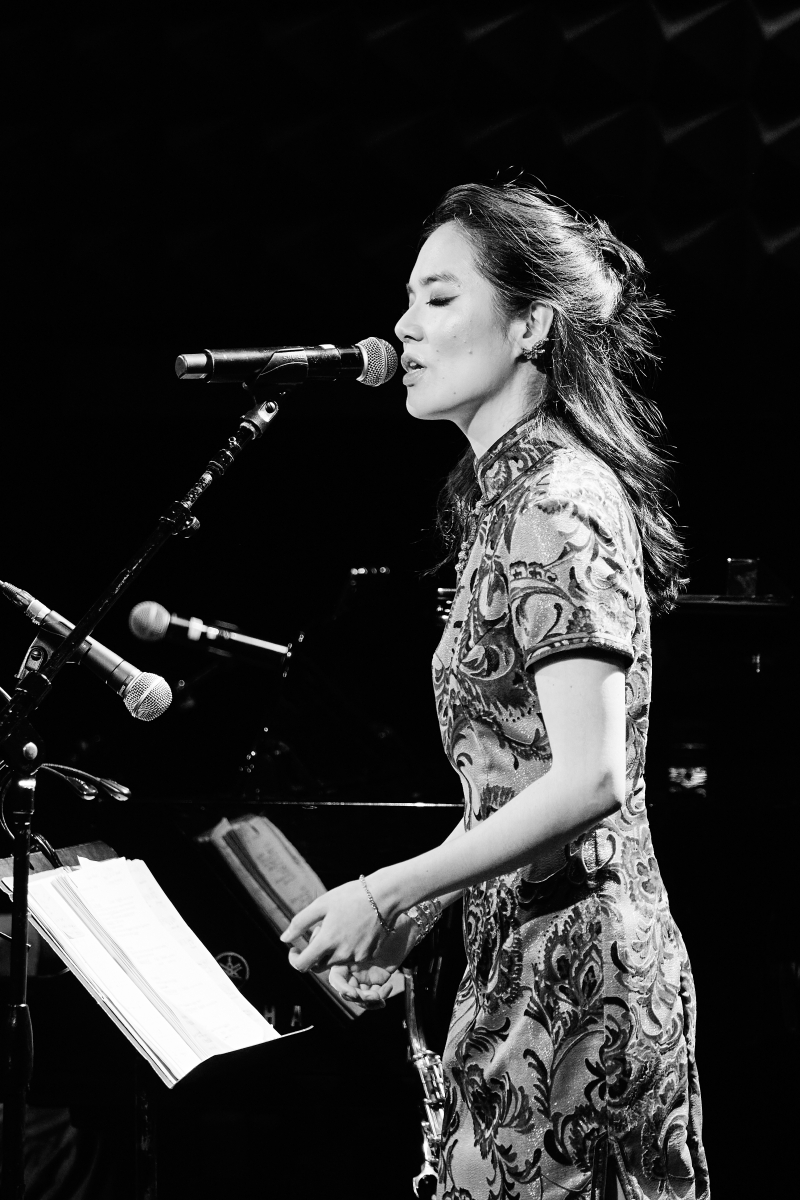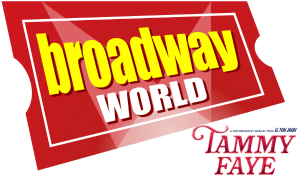Interview: Stephanie Chou Conjures Up CHINATOWN DREAMS at Joe's Pub
Stephanie Chou brings her unique blend of Asian-jazz fusion to Joe's Pub on 10/23, premiering new material in "Chinatown Dreams" with her quintet.

.png)
On October 23, vignettes of Chinatown will come alive with a unique fusion of East and West at Joe’s Pub. Stephanie Chou, composer, saxophonist, and singer, brings her quintet back to this iconic venue for a special performance titled Chinatown Dreams.
Chou’s musical journey is as intriguing as her compositions, which often include mathematical concepts, calling back to her time studying at Columbia University. Their upcoming performance will showcase this distinctive style, featuring live premieres of newly-written material alongside fan favorites from her eclectic repertoire. The show offers an opportunity to experience Chou’s evolving sound, which has been honed through performances across the globe and collaborations with diverse artists.
We sat down with Stephanie Chou for insights into her creative process, her upcoming show, and the intersection of her worlds.
As someone with a mathematics background, how has your understanding of math influenced your approach to composition and musical structures?
I think my math background informs everything in my life, not just music. Sometimes it informs my composition process in direct ways - say, using mathematical principles as tools to compose - and sometimes in more abstract ways that form the basis of how I think (being drawn to patterns, symmetry, hearing/seeing harmonic shapes, seeking out logic, etc). I find math to be very beautiful, and sometimes write music incorporating mathematical ideas; on my first album Prime Knot, I paired mathematical knots with different arrangements of a traditional Chinese song. Sometimes I write “math songs” with lyrics about math, like “Continuum Hypothesis.” One day I plan to write a song cycle about math.
You blend Chinese musical influences with Western jazz and pop. Can you share a specific example of how you’ve fused these different traditions in an innovative way?
Blending Asian influences with jazz and pop is a big part of what I do. One specific example is “Eating Grapes”:
This is a my voice/drum duo, based on the well-known tongue twister: 吃葡萄,吐葡萄皮;不吃葡萄,不吐葡萄皮。If you eat grapes, you spit out the peels, and if you don’t eat grapes, you don’t spit out the peels. This is a very popular tongue twister, and I set it to rhythms and improvise about other silly things related to grapes (are there seeds inside? Different colors of grapes, who eats them? Do we all eat them?), etc. This is one of my signature pieces.
On a larger scale, my song cycle Comfort Girl, about the Asian comfort women abducted into sexual slavery during WWII, combines a long-hidden history and survivor testimony with the energy of improvised jazz.
The music highlights an often-overlooked, dark chapter in history that still has echoes today, as survivors continue to fight for justice, historical revisionism threatens progress, and human trafficking remains a major global issue.
You’re incorporating both English and Mandarin lyrics in Chinatown Dreams. How do you decide which language to use for different parts of the story, and how does this bilingual approach enhance the narrative?
A bilingual lens has always been part of my approach to lyrics and language in general, and reflects my own Asian-American background - I learned Mandarin at a young age (although my ability level peaked at approximately that of a native-speaking elementary school kid!). I am definitely an ABC (American Born Chinese) - so there’s some Chinglish that is used, sentences/phrases half in English and half in Chinese, idioms from both cultures - I’d say the lyrics really represent my Asian-American experience.
In general when deciding whether lyrics are in English or Mandarin, or a mix of both, I decide partially based on the audience, and partially based on what I think sounds best aurally, or fits the mood of a particular song.
This is your band’s first “regular” show in NYC in over a year, and you’re premiering new material. How has your sound or approach evolved?
We have two main shows we usually present - our “regular” Asian-jazz fusion show and my Comfort Girl song cycle, which was the last piece we played at Joe’s Pub in April. We’ve been performing our regular quintet show out on the road a lot this year outside of NYC, but it’s always nice to play it for a hometown audience.
For anyone who has seen the show before - this one will be a mix of our core material that best represents my band’s sound, and an extension into some new sonic places. For anyone who hasn’t seen the show before, I’d say it’ll be a good representation of what the band’s Signature Sound is.
The new material we’re premiering contains some music written during the pandemic - for example, some of the pieces are settings of Tang Dynasty poems written for choir + orchestra - but those haven’t been performed live, and I reworked the arrangements for my band’s smaller instrumentation. Another piece is a new one, “Dragon,” which I wrote earlier this year for erhu and string trio in celebration of the Year of the Dragon - but we’ll do a “jazz small group” version of it. I’m excited to see how some of the pieces sound with a different arrangement/instrumentation.
Some other new material is my arrangements of popular songs from the 1960’s and earlier, within the Asian-jazz-fusion realm.

I think over the years my sound and approach have evolved to become even more singular and more immediately identifiable - that’s the hope anyway! Regardless of instrumentation, genre, topic, or format - I’m always striving to create music that still sounds authentically like me and my artistic voice, while simultaneously stretching into new places.
As both a composer and performer, how do you balance the structured elements of your compositions with the spontaneity of live jazz performance, especially when premiering new material?
Great question! Each piece has a zone it lives in, as far as the amount of composed parts vs improvised parts, which is often determined beforehand during the composition or rehearsal phase. Some of my music is completely through-composed, while other pieces are very free and have a lot of improvisation. The more improvised the pieces are, the more each performance will vary. I’d say these days, more of my music is becoming more through-composed. Mostly I try to find a unique balance of improvisation vs composition - which can be flexible even within a piece, sometimes depending on where the musicians want to take things in that particular performance, etc.
A lot of the balance and spontaneity you describe really comes from the band: I deeply trust my bandmates as collaborative sonic adventurers, and we’re exploring the pieces together. Each performance is like having a different conversation.
Anything else you’d like to share?
We’re looking forward to some upcoming Bay Area dates (Nov 8 at SFJazz, Nov 9 at the San Jose BreakRoom, Nov 10 at Palo Alto Arts Center) - our first time bringing my music out there!

The studio version of the Comfort Girl song cycle will be out in spring 2025 - I’m really looking forward to that as we’ve been working on the recording for many years.
We’re also hoping to record Chinatown Dreams in late 2025, and I have other projects in-progress as well. The Chinatown Dreams album will be more progressive-rock influenced than the live presentation next week - it will have mostly electric instruments and be more of a studio album.
Not sure when we’ll do our quintet show in NYC again - mid-2025 at the soonest probably - so we hope to see some old and new friends at the show
Tickets to Stephanie Chou's Chinatown Dreams on October 23 are available on Joe's Pub's website.
Comments
Videos
